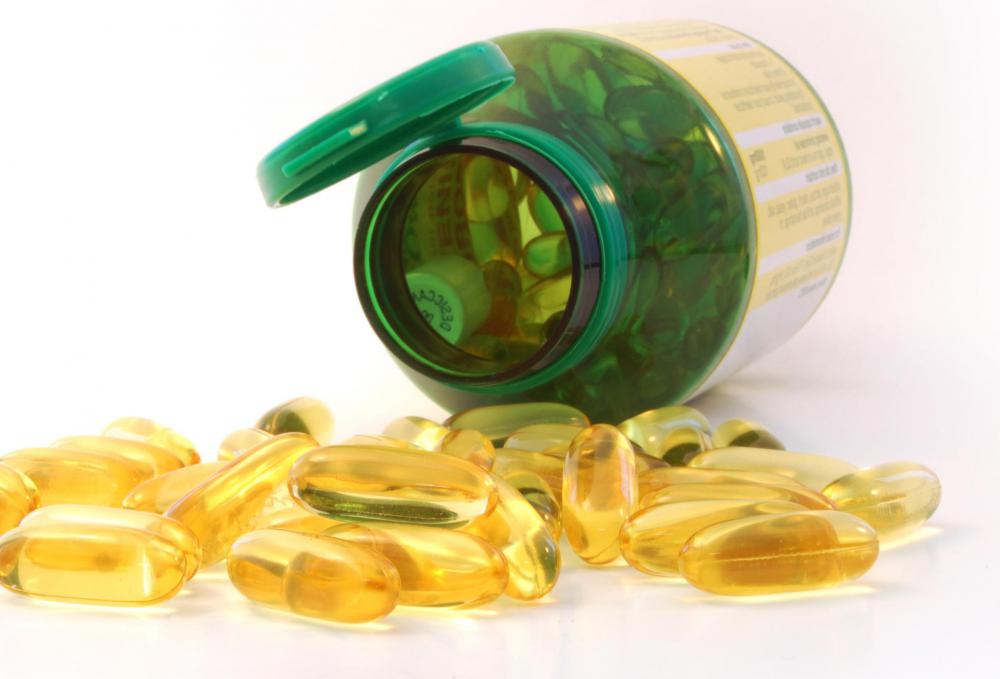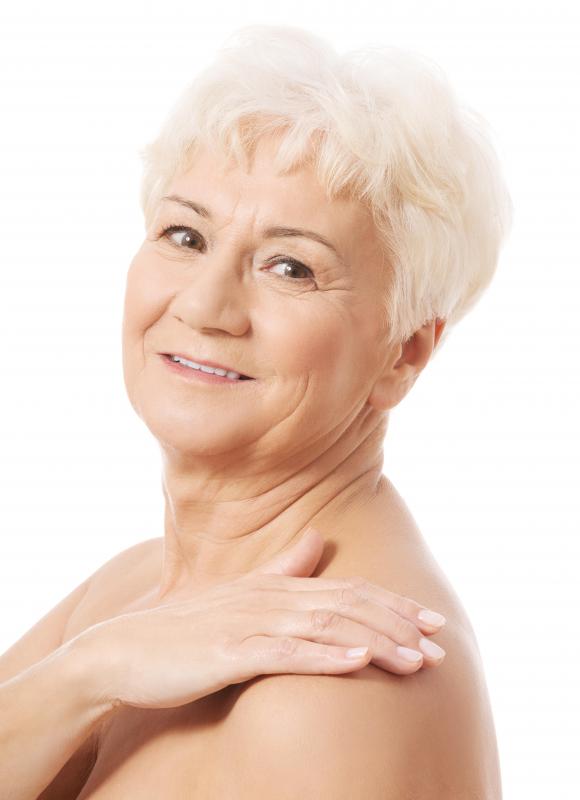At WiseGEEK, we're committed to delivering accurate, trustworthy information. Our expert-authored content is rigorously fact-checked and sourced from credible authorities. Discover how we uphold the highest standards in providing you with reliable knowledge.
How Effective Is Evening Primrose Oil for Eczema?
Evening primrose oil is generally thought to be an effective natural remedy for eczema, though a lot depends on things like how serious the condition is to begin with and how concentrated the oil is. Individual body chemistry may also play a role, such that some people may see great results right away while other people barely see any change at all. Most of the support behind using evening primrose oil for eczema is anecdotal, though some formal research has suggested a potential link. In part because it is a natural remedy, evening primrose oil isn’t usually an officially recommended treatment for eczema or any other conditions, at least not by traditional medical practitioners. It also isn’t usually regulated or controlled the way most pharmaceutical preparations are. This can lead to inconsistencies between products and brands, and most of the products sold in any given place haven’t been subjected to much testing, if any. Most oils are all natural, but this doesn’t mean that they’re completely safe for all people. Anyone who isn’t getting the results they want using this oil is usually wise to get a medical opinion, or at least talk to a health care provider to get more personalized advice and recommendations.
Understanding the Oil Generally

Evening primrose oil is extracted from the seeds of the Evening Primrose, a wildflower that is native to North America and also grows in Europe, South America and other countries. Its name comes from its yellow flowers that open in the early evening but close by the time the sun rises in the morning. The oil contains linolenic acid (LA) and gamma-linolenic acid (GLA), both of which are valuable omega-6 fatty acids that the body needs but does not produce on its own.

People who use this oil for eczema usually rub it topically onto the affected patches of skin. Taking it orally might also work, but results often take a lot longer to come about. Allowing it to soak directly into the skin where it’s irritated tends to be the most effective method of relief, though it should be noted here that the oil is merely a relief agent: it doesn’t usually cure the underlying problem at all. What this means on a practical level is that once a person discontinues use, the dry, scaly skin patches associated with eczema will usually return pretty quickly.
Scientific Studies

Scientific studies of the effectiveness of evening primrose oil for eczema have yielded mixed results. According to the Mayo Clinic and the National Institutes of Health (NIH) in the United States, more and larger studies need to be conducted before the question can be properly answered. The University of Maryland Medical Center in the US, however, reports that more than 30 human studies — including one consisting of more than 1,200 eczema sufferers — have shown it to be an effective treatment for eczema. There is also a plethora of anecdotal evidence from people who say the oil has worked wonders for them.
Common Dosage Guidelines

The typical adult dosage for evening primrose oil is between 200 and 400 mg per day for adults. When consumed orally it should usually be taken with food, and appears to be more effective when taken in conjunction with Vitamin E. Possible side effects are usually mild, and may include nausea, headache, stomach discomfort, or loose stools. These effects may go away as the body adjusts to the oil, and aren’t usually present in topical applications. People who use the oil directly on their skin usually break open capsules or purchase the oil loose, and rub it into the skin as often as needed to relieve symptoms.
Risks and Potential Side Effects

Evening primrose oil is generally thought to be safe, but does come with some precautions. In general it shouldn’t be used by anyone who has seizure disorders or who takes medication for schizophrenia because of the slight possibility that the oil may cause seizures, although these occur primarily in people with at least some history of seizures. Evening primrose oil also should be discontinued two weeks before any anesthesia is to be administered due to the same risk of seizure. Evening primrose oil should not be used by pregnant women because it may prompt early labor; in fact, it is used anecdotally to bring on or to shorten labor. The safety of using the oil while nursing is still under debate.
Reports of allergy or hypersensitivity to the oil are rare. As with any medicinal treatment, however, individuals should consult a doctor before beginning using evening primrose oil for eczema or any other medical condition.
AS FEATURED ON:
AS FEATURED ON:


















Discussion Comments
@bluedolphin-- The effectiveness of evening primrose oil for acne does not say anything about its effectiveness for eczema. Eczema and acne are unrelated. Eczema is an inflammatory condition, a type of dermatitis where the skin develops itchy patches.
Evening primrose oil is one of the best natural remedies for eczema. My brother has been using it since the past six months with good results. He told me that his skin is now hydrated and does not itch. I think evening primrose oil moisturizes skin from the inside out and fights inflammation. It's certainly worth a try for those suffering from chronic eczema.
@SteamLouis-- I tried evening primrose oil (EPO) for acne and unfortunately, it did not work for me. It actually seemed to make my acne worse.
I took the supplement for about three weeks and had more pimples during that time. My skin was a little bitter after I stopped taking EPO but I still have acne.
I don't know if EPO works for other people, but I personally do not recommend it.
I'm surprised to know that evening primrose oil has been used for acne for years. I came to know about it just recently.
I suffer from hormonal acne, can evening primrose oil help me? Has anyone here used the supplement for acne with good results?
Post your comments